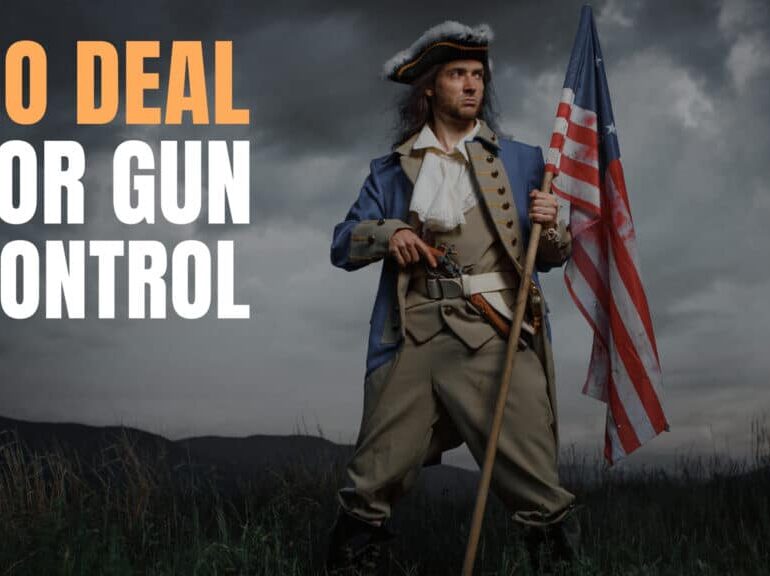
No Deal for Gun Control: How the American Revolutionaries Defied the Empire
By: Michael Boldin
June 12, 1775 – less than 2 months after Lexington and Concord and the “shot heard ‘round the world,” General Gage made an offer he felt the American Revolutionaries just couldn’t refuse.
Give up your guns and give up your friends – and the fighting can end.
Their response to this should really be something we utilize much more often today. Every time they we need to give up one thing or another – from our right to keep and bear arms, to our right to privacy, to any of our natural rights – for the sake of “security” usually – the response should be clear and concise:
NO DEAL.
St. George Tucker described the right to keep and bear arms as “the true palladium of liberty,” and the old revolutionaries certainly understood this as well.
“The right of self defense is the first law of nature: in most governments it has been the study of rulers to confine this right within the narrowest limits possible.”
This is exactly what was going in the run up to the War for Independence.
- In Sept 1774 – General Gage seized gunpowder north of Boston, so people started resigning from official militias and starting independent ones.
- Then the King banned the importation of all arms and ammunition without a permit. And guess what – no one was ever issued a permit.
- Then, Lord Dartmouth, the Royal Sec. of State for America – suggested being more aggressive. He urged Gage to “Upon no account suffer the Inhabitants of at least the Town of Boston to assemble themselves in arms on any pretence whatever, either of town guard or Militia duty.”
- Another letter to Gage pushed harder:
“all cannon, small arms, and other military stores of every kind, that may be either in any magazine, or secreted for the purpose of aiding the rebellion, should also be seized and secreted”
We know what happened – and with a goal of confiscation, the British marched on Lexington and Concord in April 1775.
After the fighting went on for almost 2 months, Gage offered amnesty In exchange for disarmament:
“I do hereby, in His Majesty’ s name, offer and promise his most gracious pardon to all persons who shall forthwith lay down their arms, and return to their duties of peaceable subjects, excepting only from the benefit of such pardon, Samuel Adams and John Hancock, whose offences are of too flagitious a nature to admit of any other consideration than that of condign punishment.”
Unlike many Americans today, the greatest generation understood that giving up guns meant total tyranny. Noah Webster put it like this:
“Before a standing army can rule, the people must be disarmed”
Of course, Gage couldn’t resist acting like a tyrant. In his “peace” offer, he also announced the beginning of martial law:
“I have therefore thought fit, by the authority vested in me by the Royal Charter to this Province, to publish, and I do hereby publish, proclaim and order the use and exercise of the Law-Martial, within and throughout this Province for so long time as the present unhappy occasion shall necessarily require”
Unsurprisingly, the American Revolutionaries didn’t take too kindly to Gage’s offer. Just weeks later, with John Hancock as president of the Second Continental Congress, they passed the Declaration of the Causes and Necessity of Taking Up Arms – co-authored by John Dickinson and Thomas Jefferson.
They also knew that Gage had made a similar promise previously, but went back on his word.
Shortly after the Siege of Boston began, Gage ordered all residents to turn in their firearms “temporarily.” After nearly 2,700 were turned in, the guns were never returned to them, and many of those promised with safe passage out of the city were prohibited from leaving.
The declaration made clear they knew the fix was in.
“The inhabitants of Boston, being confined within that Town by the General, their Governour, and having, in order to procure their dismission, entered into a treaty with him, it was stipulated that the said inhabitants, having deposited their arms with their own Magistrates, should have liberty to depart, taking with them their other effects. They accordingly delivered up their arms; but in open violation of honour, in defiance of the obligation of treaties, which even savage nations esteemed sacred, the Governour ordered the arms deposited as aforesaid, that they might be preserved for their owners, to be seized by a body of soldiers; detained the greatest part of the inhabitants in the Town, and compelled the few who were permitted to retire, to leave their most valuable effects behind.”
In short, their answer was NO DEAL.
“In our own native land, in defence of the freedom that is our birth-right, and which we ever enjoyed till the late violation of it; for the protection of our property, acquired solely by the honest industry of our forefathers and ourselves, against violence actually offered, we have taken up arms. We shall lay them down when hostilities shall cease on the part of the aggressors, and all danger of their being renewed shall be removed, and not before.”
In his article covering this important history, TJ Martinell summed it up best: “Never trusting gun grabbers is a lesson modern Americans would do well to heed.”